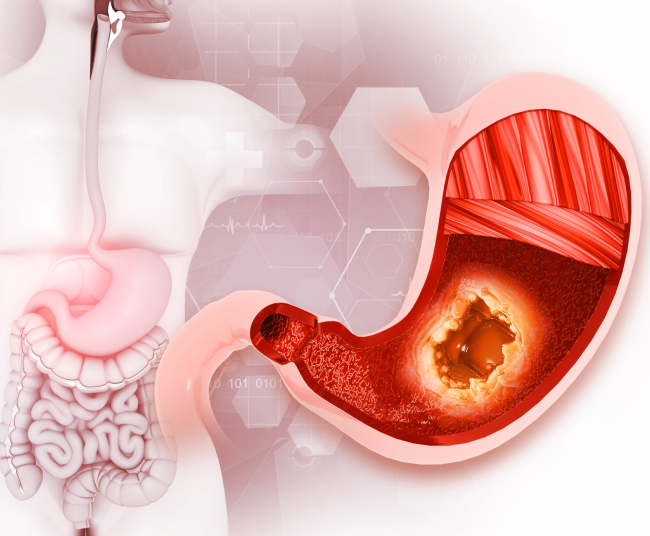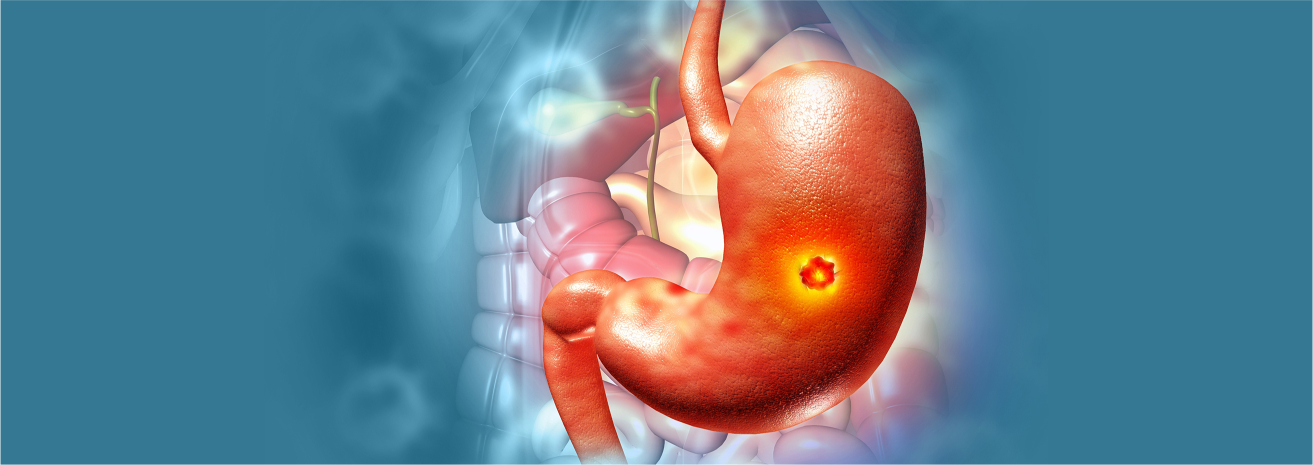Stomach (Gastric) Cancer

Stomach cancer, also known as gastric cancer, begins in the stomach lining and can spread to other parts of the body if not detected early. Although its incidence has decreased worldwide, stomach cancer remains a major health concern. Treatment often depends on the location, stage, and type of stomach cancer, as well as the patient’s overall health. At Burjeel Cancer Institute, we offer a full range of treatments, including surgery, chemotherapy, radiation therapy, and targeted therapy, all tailored to meet the unique needs of each patient.
Symptoms and Risk Factors
- Persistent indigestion or heartburn
- Stomach pain or discomfort
- Nausea or vomiting (sometimes with blood)
- Unexplained weight loss
- Feeling full after eating small amounts of food
- Difficulty swallowing
- Loss of appetite
- Fatigue
- Blood in the stool

Risk Factors for stomach cancer include
Infection with Helicobacter pylori (H. pylori)
This common bacterial infection increases the risk of developing gastric cancer.
Diet
A diet high in smoked, salted, or pickled foods and low in fruits and vegetables is linked to an increased risk.
Tobacco and Alcohol Use
Smoking and excessive alcohol consumption increase the risk.
Family History
A family history of stomach cancer increases the likelihood of developing the disease.
Previous Stomach Surgery
Certain surgeries, such as those to treat ulcers, may increase the risk of stomach cancer.
Gender and Age
Stomach cancer is more common in men and people over the age of 50.
Diagnostic Procedures
At Burjeel Cancer Institute, we offer advanced diagnostic procedures to accurately detect and stage stomach cancer, including.
Upper Endoscopy (Esophagogastroduodenoscopy or EGD)
A thin, flexible tube with a camera is inserted through the mouth to examine the stomach lining for abnormal areas and take tissue samples for biopsy.
Endoscopic Ultrasound (EUS)
This test combines endoscopy and ultrasound to obtain detailed images of the stomach and nearby structures, helping to assess the depth of tumor invasion.
CT Scan
Detailed imaging of the abdomen to check for tumors and assess whether cancer has spread to nearby organs or lymph nodes.
PET-CT Scan
Combines positron emission tomography and computed tomography to detect cancer spread to distant organs.
Barium Swallow (Upper GI Series)
X-rays taken after drinking a barium solution to highlight abnormalities in the stomach and esophagus.
Biopsy
Tissue samples taken during an endoscopy to confirm the diagnosis of stomach cancer.

Treatment Options
Targeted Therapy and Immunotherapy
- HER2-Targeted Therapy: Trastuzumab is used to target the HER2 protein in patients whose stomach cancer cells overexpress this protein.
- VEGF Inhibitors: Ramucirumab may be used to inhibit the growth of blood vessels that tumors need to grow and spread.
- PD-1 Inhibitors (Immunotherapy): Pembrolizumab may be used for advanced stomach cancer, helping the immune system recognize and destroy cancer cells.
Radiation Therapy
- External Beam Radiation Therapy (EBRT): High-energy beams are directed at the stomach to destroy cancer cells and shrink tumors, often used before or after surgery.
- Stereotactic Body Radiation Therapy (SBRT): A highly targeted form of radiation therapy that delivers precise doses to the tumor while sparing surrounding healthy tissue.
Chemotherapy
- Neoadjuvant and Adjuvant Chemotherapy: Chemotherapy is often given before surgery (neoadjuvant) to shrink the tumor or after surgery (adjuvant) to eliminate remaining cancer cells.
- Systemic Chemotherapy: Used to treat advanced or metastatic stomach cancer, with drugs such as fluorouracil (5-FU) and oxaliplatin.
Surgical Treatment
- Subtotal (Partial) Gastrectomy: Removal of part of the stomach, often combined with nearby lymph nodes and surrounding tissues, leaving some of the stomach intact.
- Total Gastrectomy: Removal of the entire stomach, usually with lymph nodes and portions of the esophagus or intestines, followed by reconstruction of the digestive tract.
- Minimally Invasive Surgery: Laparoscopic or robotic-assisted surgery options are available for some patients, offering smaller incisions, faster recovery, and fewer complications.
Multidisciplinary Approach
Stomach cancer treatment at Burjeel Cancer Institute is provided by a team of specialists who collaborate to ensure the best possible outcomes for each patient. The team includes.
- Surgical Oncologists
- Medical Oncologists
- Radiation Oncologists
- Gastroenterologists
- Radiologists
- Pathologists
- Oncology Nurses
- Genetic Counselors
- Palliative Care Specialists .
This multidisciplinary team works closely to provide personalized care tailored to the individual needs of each patient.


Supportive Care and Patient Services
We offer a variety of supportive care services to help stomach cancer patients manage their treatment and improve their quality of life. Our stomach cancer care team includes specialists in
Nutritional Counseling
Tailored dietary advice to help patients manage side effects and maintain strength during and after treatment.
Palliative Care
Symptom management and quality-of-life support for patients with advanced or metastatic stomach cancer.
Psychosocial Support
Counseling services to help patients and their families cope with the emotional and psychological challenges of a stomach cancer diagnosis.
Physical Rehabilitation
Post-surgical rehabilitation programs designed to help patients regain strength and improve mobility.
Survivorship Program
Ongoing care and monitoring for patients who have completed treatment, focusing on long-term health and recurrence prevention.
Meet Our Experts
We guide stomach cancer patients through every step of their treatment journey, providing personalized care and support.
Patient Journey
Initial Consultation
A thorough evaluation with the stomach cancer care team, including diagnostic imaging and tests to assess the extent of the disease.
Personalized Treatment Plan
A customized treatment plan is developed based on the patient’s diagnosis, preferences, and overall health.
Treatment and Support
Patients receive surgery, chemotherapy, or radiation therapy, supported by a multidisciplinary team and personalized supportive care services.
Follow-Up Care
After treatment, patients receive regular follow-ups to monitor their recovery, assess treatment response, and manage long-term health concerns.




